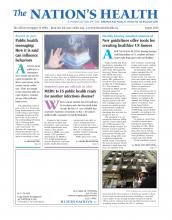One of the leading cancers among both men and women is colorectal cancer — cancer of the colon or rectum. If caught early, such cancer is highly treatable. That’s why preventive screenings, such as a colonoscopy, are important to maintaining good health.
A colonoscopy is a preventive exam where a doctor uses a flexible tube to examine the colon and rectum for early cancer or growths called polyps that could be cancerous. It can also be used for intestinal symptoms, such as bleeding.
Colonoscopy is recommended as early as age 50 and up to age 75, according to the Centers for Disease Control and Prevention. People those ages should get a colonoscopy every 10 years, according to the U.S. Preventive Services Task Force. However, if you have a family history of colorectal cancer, it may be necessary for you to get a colonoscopy as early as 10 years before the age of a parent or sibling who was diagnosed, says Deborah Fisher, MD, MHS, an associate professor of medicine in the Gastroenterology Division of Duke University School of Medicine and a National Institutes of Health-funded researcher. People with inflammatory bowel disease are also at higher risk for colorectal cancer and may require earlier and more frequent exams, Fisher says.
When colorectal cancer is found early, 90 percent of people live five or more years. But there are still one in three adults in the U.S. between ages 50-75 who don’t get regular screenings, CDC says.
If you’re squeamish about getting a colonoscopy, talk to your doctor beforehand about your fears or concerns. And don’t be scared off by the test preparation.
“A number of studies have shown the general anecdotal experience that the prep is the worst part,” Fisher says. “They’re thinking, ‘Oh my goodness, if this is just the prep, what’s the test going to be like?’ But that’s the worst part of it.”
To prepare for your appointment, your health provider will most likely prescribe you a laxative — a drug that makes it easier for you to have bowel movements. The laxative will help clear your colon so the physician performing the exam has a clear look for any abnormal tissue.
“You don’t want to go through the whole thing twice,” Fisher says. “You want to be nice and clean so you’re off the hook, depending on what’s found.”
The day before your colonoscopy you should be on a clear liquid diet, CDC says. Talk to your health care provider about what is appropriate to consume before the exam. Following directions when taking your laxative and sticking to clear liquids is essential to having a successful test, Fisher says.
“Some people can work the day of, but that evening you shouldn’t have anything planned,” Fisher says. “You want to be home. You want to be comfortable.”
During the procedure, a doctor may spot one or more polyps and remove them, Fisher says. Your health provider should inform you about anything that seems suspicious and next steps. Depending on your results, your doctor may ask you to come back for a follow-up colonoscopy between three and five years, instead of 10.

Photo by Alina555, courtesy iStockphoto
You may be sedated and sleeping during the exam, according to CDC. Because of this, it’s important to have a designated ride there and back because you may feel out of it during the rest of the day, Fisher says. If you don’t have transportation, ask your health care provider if there are any options for you to secure a ride.
Most people are back to their normal routine the next day, she says.
A colonoscopy isn’t the only preventive test to evaluate colorectal cancer risks, Fisher says. Two tests — the fecal occult blood test and the fecal immunochemical test — are at-home chemical tests to check for blood in the stool. Ten percent of adults who get tested for colorectal cancer use at-home tests, CDC says.
Another exam is a sigmoidoscopy, where a doctor uses a shorter tube to look for abnormalities or polyps inside the rectum and only the latter third of the colon instead of the entire colon, Fisher says.
There is no single best test, according to CDC, as each one has pros and cons. CDC recommends talking to your doctor to find out which tests are right for you.
Over 50? Don’t put off your exam
More than 90 percent of colorectal cancer cases occur in people ages 50 and older, CDC says. Lifestyle risk factors include alcohol and tobacco use, obesity, a diet short of fruit and vegetables and lack of physical activity, CDC says.
“People don’t like cancer tests because they don’t want to hear bad news,” Fisher says. “It’s very treatable in its early stage. It’s not something where you get the test, get the bad news and then go ‘What do I do?’ You do want to catch it early because it’s...very difficult to treat later.”
For more information, visit www.cdc.gov/cancer/colorectal
- Copyright The Nation’s Health, American Public Health Association









